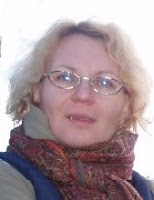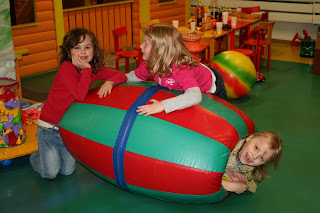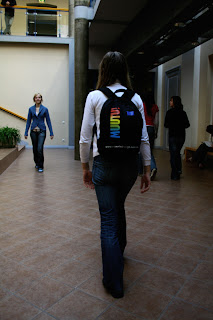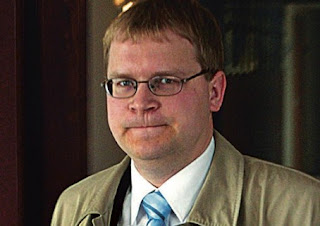
Tuesday, April 24, 2007
Another gallup

Thursday, April 19, 2007
Interesting facts about EU countries

The World Competitiveness Yearbook ranked Austria No. 2 in quality of life,
surpassing the U.S. and Japan.
Belgium
Belgium is the world’s largest diamond center and second largest petrochemical center.
Cyprus
Cypriot culture is among the oldest in the Mediterranean. By 3700 BC, the island was
well inhabited, a crossroads between East and West.
Czech Republic
The Czech Republic is No. 2 in investment incentives and No. 3 in investment in telecommunications among 60 leading economies.
Denmark
Denmark is a world leader in energy efficiency and conservation. Today, Denmark is
favored by a flexible and diverse energy supply structure marked by a high percentage
of renewables. Wind energy alone accounts for 20 per cent of the total power
generation in Denmark.
Estonia
Estonia has had an average growth rate of about 6 percent over the past five years. It is so wired that it is nicknamed E-stonia. Bars and cafes are universally equipped with
wireless connections.
Finland
Finland has been ranked the least corrupt country for several consecutive years.
France
France is the most visited country in the world.
Germany
Germany has the world’s third largest and Europe’s largest economy. Germany leads the world in exports; 10.1 percent of world exports come from Germany.
Greece
Greece has the largest merchant fleet in the world.Greek-owned ships lead in the world’s merchant tonnage.The Greek fleet accounts for 16 percent of the global shipping force.
Hungary
Hungary tops the world’s leading trading nations in imports and exports as a share of
GDP.
Ireland
Ireland leads the world in high technology exports as a share of total exports. Over half of Ireland's manufacturing exports are high technology products.
Italy
Italy is home to the greatest number of sites on UNESCO’s world heritage list.
Latvia
Cell phone coverage is available over 99 percent of Latvia’s territory.
Lithuania
Lithuania is the largest EU contributor to the NBA: 6 players this year.
Luxembourg
Luxembourg ranks as the world’s top city for personal safety and security.
Malta
Malta welcomes 1.2 million tourists a year (triple its population of 400,000).
The Netherlands
The Dutch are strong inventors and developed the compact disc, the microscope, and
the artificial heart.
Poland
Polish glass makers built and operated the first factory in the New World, in
Jamestown, Virginia, in 1608.
Portugal
Portugal could become the world's 10th largest tourism market by 2020, attracting
almost quadruple the current number of tourists, according to the World Tourism
Organization. Wine tourism is growing at a strong 7 to 12 per cent a year in Europe,
and Portugal is one of the main destinations. Portugal’s annual income from the golf
industry represents 1.25 per cent of national income and 14 per cent of all income from tourism.
Slovakia
The hill known as Krahule near the town Kremnica, Slovakia, is the geographical
center of Europe.
Slovenia
Slovenia's Port of Koper on the Adriatic Sea provides a 7-10 day shorter route for
shipments arriving from Asia than do Europe's northern ports.
Spain
A Spanish company, Abengoa Bioenergy, is the second largest biofuels producer in the world.
Sweden
Sweden is the third largest music exporter in the world, after the U.S. and Britain.
United Kingdom
The United Kingdom is the largest exporter to the United States and the largest
recipient of U.S. investment in Europe.
Bulgaria
Bulgaria is second in the world in international IQ tests and SAT scores.
Romania
Romania has been one of the five fastest growing economies in Europe during the last
five years.
Young people are positively disposed to EU
Wednesday, April 18, 2007
"What to think then..?"
The biggest problems of the EU are related to its bureaucratic leadership, which alienates the politicians from the rest of the people. An average European doesn’t care about what is going on in Brussels.
In general the article is quite pessimistic. The EU can’t be what we want it to be, because of the dissensions between nations. I don’t even know what to say about that. I too have friends from other European countries, and I don’t see any “dissensions between nations”. What matters is the person him (her-) self and his (her) character. I suppose there was meant the dissensions between the politicians, who should speak in the name of the nation, but… history seems to show otherwise.
I thought that perhaps our homeroom teacher would have some interesting things to say about the EU. What is the effect of the EU to our (her students) lives?
Tiina Pluum:
 In the last ten years while observing my students to grow I dare to argue, that the EU has widened their limits of studying and advancing(in their life) significantly. Sincere interest of the ways different people live and see the world and the ambition to become a personality has forced the young to acquire experiences from different countries. Knowledge acquired as an exchange student, hiker, college student or as a hireling, will raise the person’s comprehension. Esteem and understanding are important values of a person in this globalized world.
In the last ten years while observing my students to grow I dare to argue, that the EU has widened their limits of studying and advancing(in their life) significantly. Sincere interest of the ways different people live and see the world and the ambition to become a personality has forced the young to acquire experiences from different countries. Knowledge acquired as an exchange student, hiker, college student or as a hireling, will raise the person’s comprehension. Esteem and understanding are important values of a person in this globalized world.Just a gallup
- 44 % of citizens think life has got worse since their country joined the club.
- 25 % of the Europeans questioned felt life in their country had improved since it joined the EU.
- People questioned in the US were much more pessimistic concerning the Emus usefulness to the environment and the economy.
Something from the brighter side:
- 35 per cent of respondents thought the constitution would have a positive impact on their country, compared with 27 per cent who thought the opposite. By far the most negative response (48 per cent) came from Britain.
In spite of many complaints about the EU, including a widespread view that it is too bureaucratic, only a minority thinks their country would be better off if it seceded from the union. Only 22 per cent of respondents in Britain, France, Germany, Italy and Spain thought their country would be better off if it left the EU, against 40 per cent who believed it would be worse off.
In my opinion – nostalgia is what makes people think, that the quality of life has gone worse since joining the EU: the grass used to be greener, the sky bluer and everything seemed to be better; that is how especially the older generation thinks, who seen these so-called golden sixties. (I presume several haven’t noticed, that France, Germany and Italy already were in the EEC at that time). I also think, that many aren’t acquainted with the conditions before the EU (about 50+ years ago). The progress has certainly been, in West-Europe too!
Before: After:


Tuesday, April 17, 2007
Kids in "Estonianity"

In the middle of their games I managed to ask them a few questions, although the presumption, that any of them would know anything about the EU, seemed quite improbable. Albeit an eight-year-old Vidrik sum it up compactly: “Well, it’s some kind of a society. Didn’t you know that?” The birthday kid said: “I don’t know… It’s a place where my daddy works.”
I only heard a consentaneous “YES!” when I asked my second question: “Do you like to live in Estonia?” Loona-Paula also mentioned the reason: “Everybody speaks Estonian here!” If I told her, that not all the people here speak our language, she said: “Yes, they don’t keep Estonian clean.”
Kirke and Eva-Liisa praised Estonia, because they are born here and it’s “very comfy” to be here.
Linda was assured: “I like Estonia the most, because Estonian flag, coat of arms and language are the most beautiful in the world. I would certainly not like to live anywhere else, cause others have uglier flags and languages.

It is a fortune in consideration of our globalization, that some parents bring their children up in the Spirit of Estonia and their children are Estonians from childhood on. This fact shows that Estonianity doesn’t vanish anywhere even due to the globalization and the EU is more like a conservator for Natives, rather than the creator of a European.
Monday, April 16, 2007
The anthem of Europe
The melody comes from Ludwig van Beethoven`s 9th symphony, which was written in 1823.
In 1972 the Council of Europe decided to name "The ode to happyness" as the anthem of the EU. A well-known composer Herbert von Karajan was asked to make three arrangements of this - one for the piano, one for brass section and one for a symphony orchestra. This anthem expresses the ideals for what Europe stands for: freedom, peace and solidarity.
In 1985 the leaders of the EU decided take this as the official anthem of the EU. It`s purpose is not to replace all the anthems of the memberlands, but to show that these countries have common values and aims in the world.
Oniomania

Unlike the rest of the Europe, we don't have strong organized labours, who represent the people of trade. Mallen offers regulating the shops opening times by the Christian pattern as a solution to the problem- it gives a splendid opportunity to the shoppers to spend their time more rationaly.

Siret agrees with Mallen, concerning the better organized labours, but she believes that the opening times of the shops are not ment to tempt the people of trade. They are shapen beacuse of consumer's demand. Furthermore the Christian percentage is not as high as in the rest of the Europe. She thinks that Mallen's idea would be a violaition of descretion and obtrusion of the Christian policy.
Siret is on the opinion that we don't have to do everything likewise the others. So what if we differ from rest of the Christian Europe because of it- let it be our peculiarity.
Sakala
Sunday, April 15, 2007
Picture of the week

there`s also a link below the writing: www-climatechange.eu.com
I guess for a long time this union has not been only an economical federation
Friday, April 13, 2007
The aims of Estonian Government in the EU

In January this year the Estonian Government set its priorities in the EU. Germany has the leading role in this period. I think, that despite of upcoming change of government these sights will generally remain the same. Now the main points:
- Estonia s aim is to help to find a solution in the European s Constitutions Treaties issue. (It is in the interests of Estonia, that the contract comes into force before the year 2009).
- Estonia supports the broadening of the EU
- To develop the innovation – politics, that would support European ability to compete in everything.
- To assure the supply of energy.
- Estonia wishes to abolish tax – hindrances in the internal market.
- It’s important to start a discussion about the EU`s tax – reform.
- To speed up the international climate – negotiations.
- To join the Schengen`s legal system on time.
- To strengthen up and develop our neighbour – politics and to support market economy in the neighbourhood of the EU.
To develop a partnership between the EU and Russia.
A small comment:
One can see, that the EU`s politics sail on a steady course. The aims are ambitious, as they are meant to be. Broadly speaking I agree with the priorities that the government posed although there are some issues that might not be advantageous to Estonia (For example the widening of EU). Must not abandon hope!
Wednesday, April 11, 2007
Paet in Bremen

Urmas Paet attended in the unofficial Gymnich meeting of the foreign ministers of EU in Bremen. After meeting his counterparts he said that EU must increase its visibility in Middle-Asia. At the meeting the foreign ministers also discussed about the relations between EU and Iran. According to Paet, EU ought to think about communicating with Iran in the level of technical cooperation. The peace process of Middle-East was also a topic at the conference. Urmas Paet pointed out that forming a government of national unity is a step forward in overcoming the innercrises in Palestine. The foreign ministers of Estonia, Hungary, Latvia, Lithuania, Poland, Slovakia and Czech talked about the USA visa-abolition program.
The name of Europe
Wednesday, April 4, 2007
Party for Europeans

The party for Europeans began on Saturday evening in Berlin where “Europe – The night of beauty” was announced. All the museums of the metropolis stayed opened until two o’clock in the mourning. An hour before midnight the clubnight of Europe began– more than thirty nightclubs gave everybody a chance to dance by offering music from 27 DJs – one from every memberland of the EU.
Sunday brought dozens and dozens of people to the Brandenburg gate. There were over 75 info-pavilions, in which every country of the EU had an opportunity to introduce itself. All members presented their state by offering native food and snacks. For instance in Estonian tent you could try roast meal mixture and buy grilled sausages and sweets from Kalev. On the big stage stars from all over the Europe gave a concert dedicated to EU. The gaieties were ended with fireworks as the German Youth orchestra played the anthem of Europe.
The young people of Europe say NO! to smoking
www.help-eu.com


